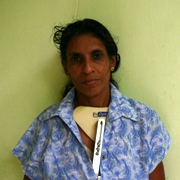Dear friends,
The Asian Human Rights Commission is pleased to report strong progress in the complaint of a road accident victim, whose case was wilfully mishandled by police and a judge. The judge allowed himself to be misled by police officers and when the victim complained, he closed the case. This is now being thoroughly investigated, with support offered to the victim by the Kandy Criminal Investigation Division (CID) and the involvement of officers from CID headquarters. However some obstacles are being encountered and those involved in the case are concerned that the magistrate will not be held to account.
CASE NARRATIVE:
 Shortly after an urgent appeal was issued in February this year, an investigation was launched into the closing of Malani Serasinghe’s case after she refused to take settlement pay from the wrong person. Malani was seriously injured when she was run over by a motorbike, as detailed in AHRC-UAC-010-2010. An unknown person was substituted as the accused by police, with the knowledge of the judge.
Shortly after an urgent appeal was issued in February this year, an investigation was launched into the closing of Malani Serasinghe’s case after she refused to take settlement pay from the wrong person. Malani was seriously injured when she was run over by a motorbike, as detailed in AHRC-UAC-010-2010. An unknown person was substituted as the accused by police, with the knowledge of the judge.
In February the Inspector General of Police informed the AHRC that the Deputy Inspector General of the Central Ranges would inquire into the case. Malani reports that she was then contacted by Kandy police in March, and that her complaint was taken. She told us that a statement had also been taken from the real perpetrator and that several witnesses had been contacted, including the three-wheeler driver who had taken her to the hospital. On 12 June Malani was invited back to Kandy Police Station to discuss the case, and she has been asked to give her statement to the Assistant Superintendent of Police later in the month. On 15 June she was visited by officers from the Kandy CID who promised their support and protection, should she go ahead with the case against the police.
This progress is heartening and the AHRC looks forward to Malini’s case being correctly tried, and for the then-acting magistrate, Umesh Chanaka Kalansooriya, and police officers to be prosecuted in a display of zero tolerance against corruption. It also expects the Judicial Commission service to inquire into the case and take disciplinary action against Mr. Kalansooriya.
We are concerned that a local rights organisation has been continually prevented from getting a copy of the B Report (No. 22482). After first being sent the wrong file, the group has been blocked from accessing the report with various excuses from the registrar’s office among them: that the report is locked in the record room, that has gone missing, and that it is ‘unavailable’. We urge the registrar to rectify this immediately.
ADDITIONAL INFORMATION:
It is a criminal act for a judge to tolerate the abuse of the legal system by police. The law continues to be used as a tool of harassment by those who work with it in Sri Lanka, and this not only leaves civilians vulnerable but significantly reduces public confidence in the court
It also paves the way for fabricated charges. The AHRC has documented numerous cases in which the names of persons have been pasted into charge sheets for cases they had no connection to. See recent UAs: Panadura North Police mislead the judiciary and detain a man for forty days or Police torture and fabricate charges against a young man for revenge. It is the duty of a judge to act as a check on police corruption, not as an aid to it.
The victim was originally upset at the prospect of charging the accused, who is the same age as her son, although her injuries were severe and the young man allegedly had no driver’s licence. Malani reports that her resolve was hardened by the response from the driver’s family, and the police. She says: “They gave us no consideration. They said, ‘we have money and the police and judge are in our hands, so we can do whatever we want. So now I want to fight for justice.”
Malani still needs to wear a body brace, which she takes off at night, and cannot lift her right arm completely. She has X-rays and medical reports from a neurological consultant at the Teaching Hospital of Kandy. Since the accident she hasn’t been able to work in their paddy field or tend to the family’s livestock, and they have had to rent out the land. The hearing in her right ear is still impaired. Her next step will be to file for compensation.
——————————–
Thank you.
Urgent Appeals Programme
Asian Human Rights Commission (ua@ahrc.asia)